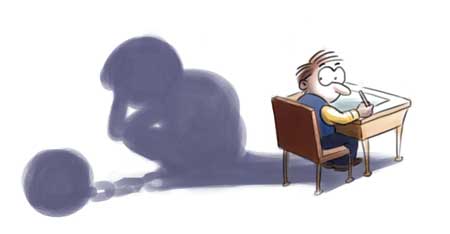Too soon to give China's examination system an F
 |
|
[By Liu Rui/Global Times] |
Nobody seems to like China's test-orientated school system. The emphasis on the examinations, it's argued, distorts students' priorities and ruins their experiences of childhood.
Instead, parents and educators are looking for change, for a system that balances students' needs and allows real evaluation of students.
The brave new world is called quality-oriented education, a mode that caters to students' "balanced growth" and creativity by reforming the curriculum, teaching practices and mechanisms of selection.
Over 14 years since quality-oriented education officially became a central element of China's education reform, as proclaimed by the Ministry of Education, when it will be introduced is still a mystery. Many people are convinced that the schools are still places for pedagogues to swamp students with useless exam tactics.
Many parents loathe test-oriented education not just because of its unproductive nature, but because it makes their children unhappy and they cannot see its point.
The quality-oriented education thus stems from the feeling of unease. So far it's orientated around dislike of the current system rather than rigorous analysis, such as comparisons of future academic performance, psychological health, social skills, and the job prospects of graduates.
There needs to be workable and practical plans based on the experiences of experimental programs, including comparisons on students' future academic performance, job prosperity and average incomes among groups of different modes, the quality-oriented education lacks even a workable plan to materialize.
But test-oriented education is compatible with the inadequate financial provision and scarce higher education resources. Any compromise would create huge problems of inequality among the rich and the poor.
The backlash against test-oriented education went astray from the start. The clamorous debate reflects the disagreement and confusion among the capricious adult world, at a time of dramatic changes and mass expansion of education. It doesn't necessarily reflect the needs of young students, who need to realize the importance of learning for themselves.
 0
0 






